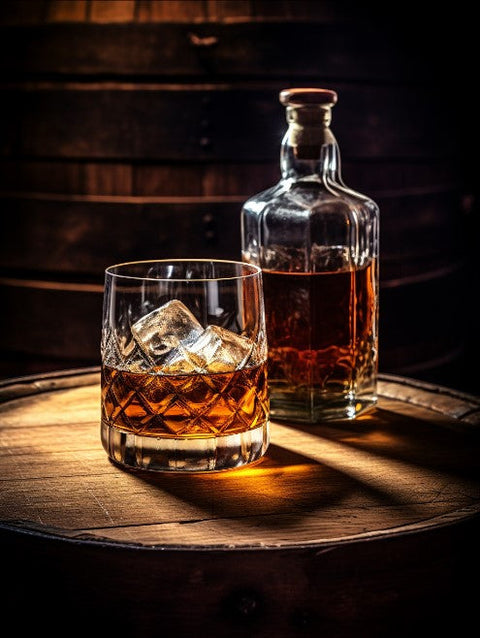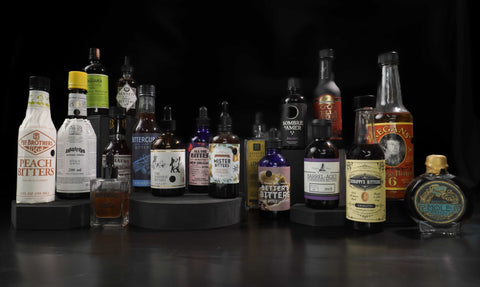This article comes to you from the team of Alambika, leveraging our years of industry expertise to enrich your knowledge.
More than just a cocktail store, we are a collective of Montreal-based experts dedicated to the art of mixology and the culture of hospitality.
Every product mentioned has been personally assessed by us for quality, incorporating advice from leading bartenders and sommeliers, to ensure inclusion in our extensive portfolio.
By choosing Alambika, you're not only supporting our community but also ensuring access to outstanding products that meet our rigorous standards.
As we turn the calendar page to February, there's a growing movement that's catching the attention of both health enthusiasts and the socially conscious alike. It's called "Dry February," an initiative encouraging people to abstain from alcohol for the entire month. While the concept may sound straightforward, its roots and implications run deep, offering a unique opportunity to reflect on our relationship with alcohol.
Origins of Dry February
Dry February finds its origins in the public health campaign known as "Dry January," which started in the United Kingdom. Initiated by Alcohol Change UK, a charity aimed at reducing the harm caused by alcohol, Dry January has been a successful annual event since its inception in 2013. It challenges individuals to start the new year on a healthy note by avoiding alcohol for a month. This initiative quickly gained traction, not only in the UK but across the globe, leading to the emergence of Dry February.

More Than Just a Month Without Alcohol
The essence of Dry February extends beyond the simple act of not drinking. It's a time for individuals to reassess their drinking habits, understand the impact of alcohol on their health, and potentially reset their relationship with it. For many, it's an eye-opening experience that highlights how central alcohol can be in social situations and how life can be equally enjoyable, if not more so, without it.
Dry February also carries significant social implications. It fosters a greater understanding of the challenges faced by those who choose to live alcohol-free, whether for health reasons, personal preference, or struggles with addiction. It encourages empathy and support within communities, making social environments more inclusive for everyone.
The Montreal Context
In Montreal, a city known for its vibrant nightlife and culinary scene, Dry February is gaining momentum. It's not just about abstaining from alcohol; it's about embracing a healthier lifestyle and being mindful of our choices. As more people participate, it's inspiring a shift in how we socialize and celebrate, highlighting that fun and enjoyment don't necessarily require an alcoholic beverage in hand.
The Rise of Non-Alcoholic Beverages
In a world where health consciousness is on the rise and lifestyle choices are increasingly varied, non-alcoholic beverages are becoming more than just a trend – they're a statement. But what exactly sets these beverages apart from the usual array of juices and syrups? Let's delve into the art and science behind them.
More Than Just a Substitute
Non-alcoholic beverages are not merely replacements for their alcoholic counterparts; they are a category in their own right. These drinks are crafted with the same care and complexity as traditional alcoholic beverages. The goal? To provide an experience that rivals, and sometimes surpasses, that of standard cocktails and spirits.
The Craft Behind Non-Alcoholic Spirits
The creation of non-alcoholic spirits involves a sophisticated process. It's not about removing the alcohol from existing spirits; it's about building flavors from the ground up. Distillers use a combination of botanicals, herbs, and spices to mimic the complexity and mouthfeel of alcohol. The result is a beverage that offers the nuanced flavors and depth that one would expect from a premium spirit, minus the alcohol.
Why Not Just Juices or Syrups?
While juices and syrups are common mixers in the world of cocktails, they lack the complexity and sophistication of non-alcoholic spirits. These spirits offer a balance of flavors – bitterness, sweetness, acidity, and spiciness – that juices and syrups alone cannot provide. This complexity is what makes non-alcoholic cocktails a genuinely satisfying alternative for those choosing not to consume alcohol.

The Diversity in Non-Alcoholic Options
The range of non-alcoholic beverages available today is impressive. From non-alcoholic versions of classic spirits like gin and whiskey to innovative creations featuring exotic botanicals and flavors, there is something for every palate. This diversity is not just about taste; it's about offering choices that align with a variety of lifestyles and dietary preferences.
The Diverse World of Non-Alcoholic Beverages
While non-alcoholic spirits have been gaining the spotlight in the beverage industry, they represent just one facet of an ever-expanding universe of alcohol-free options. From beers to wines and beyond, the choice for those seeking non-alcoholic alternatives has never been more exciting and varied. In this chapter, we'll explore the breadth of these options, many of which are proudly offered at Alambika.
Non-Alcoholic Beers: A Refreshing Alternative
Gone are the days when non-alcoholic beer meant a compromise in taste. Today's alcohol-free beers are brewed to offer the same rich flavors and aromas as their alcoholic counterparts. Using innovative brewing techniques, these beers retain the depth and character that beer enthusiasts love, minus the alcohol. From hoppy IPAs to rich stouts, the variety is impressive.
Wine Without the Wine-ing
Non-alcoholic wines are another category that's seen remarkable innovation. Winemakers use techniques like vacuum distillation and reverse osmosis to gently remove alcohol while preserving the wine's essential flavors and aromas. This process results in non-alcoholic wines that maintain the complexity and nuance of traditional wines, perfect for those special dinners or to unwind after a long day.
Sparkling Wines: Celebrations Sans Alcohol
For those special occasions, non-alcoholic sparkling wines offer a sophisticated alternative to toast with. These beverages provide the same festive feel and bubbly effervescence as traditional champagne or prosecco, but without the alcohol. They are perfect for inclusive celebrations where everyone can join in the toast.
Preassembled Mocktails: Convenience Meets Taste
For those seeking a quick and easy way to enjoy a sophisticated drink, preassembled mocktails are a great option. These ready-to-drink beverages come in various flavors and styles, offering the convenience of a crafted cocktail without the need for alcohol or additional mixology skills.
Expanding Horizons with Non-Alcoholic Spirits
The innovation in this field goes far beyond simply mimicking the usual suspects like gin, tequila, or rum. Today's non-alcoholic spirits venture into the realms of complex liqueurs and bitters, bringing a whole new level of variety to the alcohol-free experience.
Take, for instance, the world of Italian amaros, known for their rich, herbal bitterness. Non-alcoholic versions of these digestifs capture the intricate balance of herbs, roots, and botanicals, providing the depth and complexity expected from their alcoholic counterparts. Similarly, non-alcoholic triple sec offers the citrusy sweetness and aroma essential to many cocktails, but without the alcohol content, making it a perfect addition to a mocktail repertoire.
Vermouth, another staple in the cocktail world, is also available in non-alcoholic forms. These versions retain the aromatic, herbal qualities and the subtle bitterness that make vermouth a key ingredient in classics like the Martini or Negroni. For those who enjoy the nutty, sweet flavor of amaretto, non-alcoholic alternatives provide that distinct almond-like taste, making them ideal for use in a variety of mixed drinks or as a delightful sipping experience on their own.
The craft of creating these non-alcoholic spirits involves a meticulous process of blending natural ingredients to achieve a flavor profile that respects the essence of the original spirit. Distillers and creators use various techniques, including maceration, infusion, and distillation, to extract and combine flavors. The result is a range of non-alcoholic spirits that not only mimic the taste of their alcoholic inspirations but also offer a new dimension of flavor for those seeking a non-alcoholic option.
At Alambika, we recognize the artistry and craftsmanship that go into these non-alcoholic spirits. Our selection is carefully curated to include the finest examples of non-alcoholic alternatives to bitters, liqueurs, and traditional spirits. We believe that the enjoyment of a well-crafted beverage should not be limited by its alcohol content, and our collection reflects this ethos.
Alambika's Role in the Non-Alcoholic Movement
As the trend towards mindful drinking and the appreciation for non-alcoholic beverages continue to grow, Alambika stands at the forefront of this movement in Montreal, playing a pivotal role in shaping a more inclusive and health-conscious drinking culture.
A Rich Array of Non-Alcoholic Options
At Alambika, we pride ourselves on offering an extensive selection of non-alcoholic options. Our shelves are stocked with a diverse range of alcohol-free products, from sophisticated non-alcoholic spirits that mimic everything from gin to Italian amaro, to non-alcoholic beers, wines, and sparkling alternatives. This variety ensures that our customers can enjoy the complexity and enjoyment of traditional alcoholic beverages, without the alcohol. Our goal is to cater to every taste and preference, providing high-quality alternatives for those choosing to abstain from alcohol, whether for a month, like Dry February, or as a lifestyle choice.

Alkademie: Educating on the Art of Mocktails
In our in-house bar, Alkademie, we take the experience a step further by offering cocktail classes that are inclusive of non-alcoholic options. These sessions are not just about crafting cocktails; they're also focused on creating exquisite mocktails. We teach the art of balancing flavors, using non-alcoholic bitters, syrups, and spirits to create drinks that are as visually appealing and complex in taste as their alcoholic counterparts. These classes are perfect for both the amateur enthusiast and the seasoned mixologist looking to expand their repertoire.
Collaboration with Éduc'alcool
Our commitment to responsible and mindful drinking extends to our collaboration with Éduc'alcool, an organization dedicated to promoting a culture of moderation and informed, responsible alcohol consumption in Quebec. Through this partnership, we aim to raise awareness about the importance of moderation and the availability of delightful non-alcoholic alternatives. By aligning with Éduc'alcool, we reinforce our message that enjoying a drink doesn't always mean consuming alcohol.
Partnering with Bars and Restaurants
Alambika’s influence is not limited to our store; we actively work with bars and restaurants, assisting them in translating their menus to include non-alcoholic versions of popular cocktails. This collaboration not only diversifies their offerings but also makes their venues more inclusive. We help these establishments curate a selection of non-alcoholic ingredients and provide guidance on how to craft mocktails that are as intriguing and flavorful as their alcoholic versions. Our expertise in this area ensures that their non-alcoholic menu items are anything but an afterthought, appealing to a wide range of customers who are either temporarily or permanently abstaining from alcohol.
Do you own a bar/restaurant and would like to participate?


